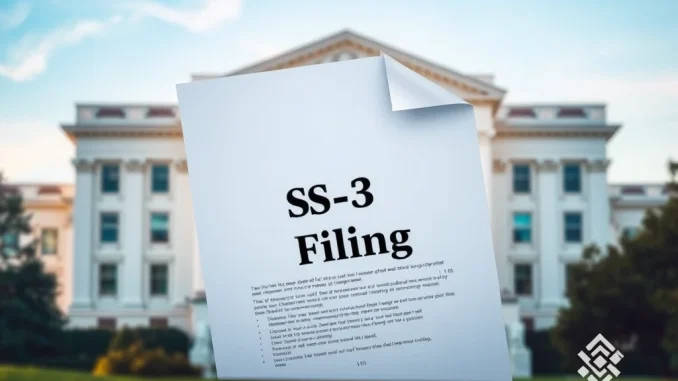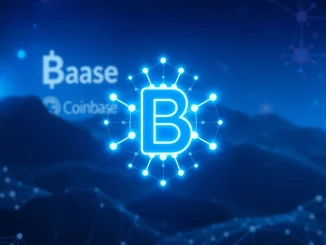
The world of cryptocurrency often intersects with traditional finance and its regulators. Recently, news broke that DeFi Development, a company previously known as Janover, has hit a hurdle in its fundraising efforts, impacting its potential plans involving assets like Solana.
Why Did DeFi Development Withdraw Its SEC S-3 Filing?
According to a report shared by Wu Blockchain on X, DeFi Development decided to withdraw its S-3 registration application with the U.S. Securities and Exchange Commission (SEC). This wasn’t a small filing; it was intended to register up to $1 billion in securities for potential fundraising.
The primary reason cited for this withdrawal was the SEC’s determination that the company was ineligible. The specific issue? The absence of a required internal controls report. This highlights the stringent requirements companies face when attempting to raise significant capital through traditional regulatory channels, even within the evolving crypto landscape.
Understanding the SEC S-3 and Internal Controls Report
What exactly is an SEC S-3 filing, and why is an internal controls report so critical?
- SEC S-3: This is a registration form used by companies that have been public for a certain period and meet specific requirements regarding reporting history and market capitalization. It allows companies to register securities for potential sale “off the shelf” in the future, providing flexibility for fundraising like equity or debt offerings. It’s a standard tool for established public companies to access capital markets efficiently.
- Internal Controls Report: This report is typically required under Section 404 of the Sarbanes-Oxley Act (SOX). It involves management assessing the effectiveness of the company’s internal control over financial reporting (ICFR). A related requirement is for the company’s external auditor to attest to management’s assessment (for larger companies). Strong internal controls are fundamental to ensuring the accuracy and reliability of financial statements, which is paramount for investor protection – a core mandate of the SEC.
The lack of this crucial internal controls report made DeFi Development ineligible for the S-3 process at this time. This suggests the company may need to implement or improve its financial reporting controls significantly before reapplying.
Impact on Solana (SOL) and Future Plans
Part of the funds DeFi Development intended to raise through this $1 billion SEC filing were earmarked for purchasing Solana (SOL). The withdrawal of the S-3 means this specific avenue for acquiring SOL is currently closed off.
It’s worth noting the company’s existing position in Solana. As of the end of May, DeFi Development held a substantial amount: 621,313 SOL. This indicates a pre-existing interest and investment in the Solana ecosystem. While the planned purchase is on hold, their current holdings remain significant.
DeFi Development has stated its intention to refile the S-3 application in the future. This suggests they plan to address the deficiencies identified by the SEC, presumably by establishing or strengthening the necessary internal controls report and related processes. The timeline for a refiling remains uncertain, as implementing robust internal controls can be a complex and time-consuming process.
Challenges Navigating Traditional Finance Regulations
The experience of DeFi Development underscores the challenges crypto-native or crypto-adjacent companies face when engaging with traditional financial regulatory frameworks like those overseen by the SEC. While the crypto industry operates on decentralized principles, companies that seek to raise capital through public markets must adhere to established securities laws and reporting standards.
This incident serves as a reminder that compliance with regulations, particularly around financial reporting and internal controls, is not optional for companies looking to access broader capital pools via methods like an SEC S-3 registration. It requires significant investment in infrastructure, processes, and expertise to meet these standards.
What Does This Mean Going Forward?
For investors and observers, the key takeaways include:
- Temporary Halt: DeFi Development’s specific plan to raise $1 billion via this S-3 for purposes including buying SOL is paused.
- Compliance Focus: The company must now prioritize building out or documenting its internal controls over financial reporting to meet SEC requirements.
- Future Potential: A refiling is planned, indicating the company hasn’t abandoned its fundraising goals, but the timing depends on addressing the compliance issue.
- Existing Position: The company still holds a significant amount of Solana SOL, separate from the planned purchase.
The path for crypto companies navigating traditional finance is often complex, marked by regulatory learning curves. DeFi Development’s situation highlights the importance of robust financial infrastructure and compliance readiness for companies seeking to tap into public markets.
Summary
In a significant development, DeFi Development withdrew its $1 billion SEC S-3 registration application. The withdrawal was prompted by the SEC deeming the company ineligible due to the absence of a required internal controls report. This setback impacts the company’s immediate plans, including using some of the anticipated funds to purchase Solana SOL, although they retain substantial existing SOL holdings. DeFi Development intends to refile in the future after addressing the regulatory requirements. This event underscores the critical need for robust financial reporting and internal controls compliance for companies operating in the crypto space that wish to access traditional capital markets via mechanisms like an SEC filing.



